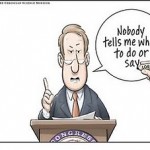 The supply of water was controlled by prepaid water meters that were installed for each household. Once the “free” allocation was exhausted, the water meters prevented additional water from flowing. That included emergency situations, such as the need to put out a fire. When a fire broke out in Phiri, an urban neighborhood of Soweto in Johannesburg, the outcome was tragic. Read more
The supply of water was controlled by prepaid water meters that were installed for each household. Once the “free” allocation was exhausted, the water meters prevented additional water from flowing. That included emergency situations, such as the need to put out a fire. When a fire broke out in Phiri, an urban neighborhood of Soweto in Johannesburg, the outcome was tragic. Read more
Tag Archives: politics
The Cochabamba water wars
 in the developing world, over a billion people lack access to safe drinking water. Many women spend over six hours a day collecting enough water for their families (and wait until after dark to relieve themselves). When it comes to sanitation, 2.6 billion do not even have access to “improved” pit latrines – open pits with simple modifications to reduce flies and odors. Read more
in the developing world, over a billion people lack access to safe drinking water. Many women spend over six hours a day collecting enough water for their families (and wait until after dark to relieve themselves). When it comes to sanitation, 2.6 billion do not even have access to “improved” pit latrines – open pits with simple modifications to reduce flies and odors. Read more
Water privatization: An investment bonanza
 From Buenos Aires to Atlanta to Jakarta, the liquid everybody needs–and will need a lot more of in the future–is going private, creating one of the world’s great business opportunities. The dollars at stake are huge. … Water promises to be to the 21st century what oil was to the 20th century: the precious commodity that determines the wealth of nations. … To turn a profit, [the privatizing corporation] must collect far more in water charges than it pays out in salaries, equipment, and interest. Read more
From Buenos Aires to Atlanta to Jakarta, the liquid everybody needs–and will need a lot more of in the future–is going private, creating one of the world’s great business opportunities. The dollars at stake are huge. … Water promises to be to the 21st century what oil was to the 20th century: the precious commodity that determines the wealth of nations. … To turn a profit, [the privatizing corporation] must collect far more in water charges than it pays out in salaries, equipment, and interest. Read more
The Affordable Care Act and the Civil Rights Act
 The Civil Rights Act barred private businesses such as hotels, bus companies, and restaurants from refusing to sell their products or services to customers on the basis of race. The ACA bars state-licensed health insurers from refusing to sell products to individuals on the basis of health status. … This basic reconceptualization of health insurance as a good whose availability is a matter of national public interest essentially frames health insurance the way the Civil Rights Act framed other business interests. Read more
The Civil Rights Act barred private businesses such as hotels, bus companies, and restaurants from refusing to sell their products or services to customers on the basis of race. The ACA bars state-licensed health insurers from refusing to sell products to individuals on the basis of health status. … This basic reconceptualization of health insurance as a good whose availability is a matter of national public interest essentially frames health insurance the way the Civil Rights Act framed other business interests. Read more
Updates: Commercialization of infidelity, medical rivalry, conservatives on climate change, football concussions
 As a practicing pediatrician, I, too, feel the nobility and privilege of my profession, and count myself lucky every day that I am able to do what I do. But to denigrate lawyers and journalists as somehow less valuable to society is beneath us as a profession. Read more
As a practicing pediatrician, I, too, feel the nobility and privilege of my profession, and count myself lucky every day that I am able to do what I do. But to denigrate lawyers and journalists as somehow less valuable to society is beneath us as a profession. Read more
The tyranny of health then and now
 When we hear the words “tyranny of health” these days, it’s usually a reference to the tyranny of health care. It brings to mind images of protesters carrying signs that denounce the “socialism” of Obamacare. As recently as 1994, however, the tyranny of health had a different meaning … the idea that patients should be coerced into being healthy. Read more
When we hear the words “tyranny of health” these days, it’s usually a reference to the tyranny of health care. It brings to mind images of protesters carrying signs that denounce the “socialism” of Obamacare. As recently as 1994, however, the tyranny of health had a different meaning … the idea that patients should be coerced into being healthy. Read more
“Tyranny of health” on KevinMD
 That we’re not routinely made seriously ill by this shortfall … is due largely to the fact that most medical interventions and advice don’t address life-and-death situations, but rather aim to leave us marginally healthier or less unhealthy, so we usually neither gain nor risk all that much. Read more
That we’re not routinely made seriously ill by this shortfall … is due largely to the fact that most medical interventions and advice don’t address life-and-death situations, but rather aim to leave us marginally healthier or less unhealthy, so we usually neither gain nor risk all that much. Read more
Soft drinks and food stamps: From bad to worse
 Science aside, I find it objectionable to single out low-income people for control by their government. Let’s not further insult the dignity of those who need food stamps in these difficult economic times by fighting the obesity battle on their backs. Read more
Science aside, I find it objectionable to single out low-income people for control by their government. Let’s not further insult the dignity of those who need food stamps in these difficult economic times by fighting the obesity battle on their backs. Read more
Democrats and Republicans: How they differ
 In the face of all this, it seems not to have occurred to a single prominent Democrat, from Obama on down, to say something like: We love our country every bit as much as they do, and we believe patriotism means expanding access to health care, protecting the environment, and imposing effective new rules on Wall Street. Democrats have thus crippled themselves by adapting comparatively limited ideas of legitimate political action, and by ceding to Republicans the strong claim of love of one’s country. Read more
In the face of all this, it seems not to have occurred to a single prominent Democrat, from Obama on down, to say something like: We love our country every bit as much as they do, and we believe patriotism means expanding access to health care, protecting the environment, and imposing effective new rules on Wall Street. Democrats have thus crippled themselves by adapting comparatively limited ideas of legitimate political action, and by ceding to Republicans the strong claim of love of one’s country. Read more
Health care reform and the 2010 elections
 Bottom line: If you want to avoid a government shutdown, or the “dysfunctional and failed republic” scenario, vote on November 2 for candidates who support health care reform. Read more
Bottom line: If you want to avoid a government shutdown, or the “dysfunctional and failed republic” scenario, vote on November 2 for candidates who support health care reform. Read more
Should doctors work weekends?
 Orszag is an economist who wants the medical “industry” to be run as efficiently as any other business. “[I]f you can’t measure it, you can’t manage it,” he says. But medicine is not like other business ventures. For one thing, its services are responsible for the life, death, and suffering of human beings. This is unique. Also, it doesn’t operate with the usual economic model of supply, demand, and shopping for competitive prices. When health hangs in the balance, time is limited and choices are few. You don’t decide to forego surgery the way you postpone the purchase of a new car. Read more
Orszag is an economist who wants the medical “industry” to be run as efficiently as any other business. “[I]f you can’t measure it, you can’t manage it,” he says. But medicine is not like other business ventures. For one thing, its services are responsible for the life, death, and suffering of human beings. This is unique. Also, it doesn’t operate with the usual economic model of supply, demand, and shopping for competitive prices. When health hangs in the balance, time is limited and choices are few. You don’t decide to forego surgery the way you postpone the purchase of a new car. Read more
The dismal future of unemployment
 The only thing highly developed countries can do in the face of cheap foreign labor is to play their ace card. Where these countries excel is with industries that are knowledge intensive – “capital-intensive advanced industries where knowledge counts for everything.” But we are unable to teach the skills required for those jobs as rapidly as the need for employment requires. Those skills constantly go out of date. Read more
The only thing highly developed countries can do in the face of cheap foreign labor is to play their ace card. Where these countries excel is with industries that are knowledge intensive – “capital-intensive advanced industries where knowledge counts for everything.” But we are unable to teach the skills required for those jobs as rapidly as the need for employment requires. Those skills constantly go out of date. Read more
Support the Fair Elections Now Act
 Watching political news on TV can be depressing and distressing. Even the most respectable news organizations treat politics as a sporting event. The Fair Elections Now Act is a chance to express support for something that could make a positive and important difference in the legislative future of the United States. It would be an enormous win for the common good. Read more
Watching political news on TV can be depressing and distressing. Even the most respectable news organizations treat politics as a sporting event. The Fair Elections Now Act is a chance to express support for something that could make a positive and important difference in the legislative future of the United States. It would be an enormous win for the common good. Read more
Lobbying against formula for babies
 You might think that companies confident in their products’ value would welcome the chance for a federal stamp of approval, not fight it. But the Big Three formula manufacturers—Nestle, Mead Johnson, and Abbot Laboratories – did just that. … Without a show of courage from the House leadership, the story of WIC and functional ingredients could turn out to be yet another well-known Washington narrative — powerful, wealthy corporations fighting straightforward, evidence-based policymaking. Read more
You might think that companies confident in their products’ value would welcome the chance for a federal stamp of approval, not fight it. But the Big Three formula manufacturers—Nestle, Mead Johnson, and Abbot Laboratories – did just that. … Without a show of courage from the House leadership, the story of WIC and functional ingredients could turn out to be yet another well-known Washington narrative — powerful, wealthy corporations fighting straightforward, evidence-based policymaking. Read more
Merchants of Doubt
 It’s easy to understand – if not condone – the behavior of politicians who are financed by tobacco and oil companies. They oppose the regulation of smoking or pollution because they benefit from the financial contributions of those industries. But what motivates certain scientists to relentlessly cast doubt on peer-reviewed scientific evidence that’s inconveniently contrary to financial interests? Read more
It’s easy to understand – if not condone – the behavior of politicians who are financed by tobacco and oil companies. They oppose the regulation of smoking or pollution because they benefit from the financial contributions of those industries. But what motivates certain scientists to relentlessly cast doubt on peer-reviewed scientific evidence that’s inconveniently contrary to financial interests? Read more
Childhood obesity and will power
 Between 1985 and 2000, the retail price of carbonated soft drinks rose by 20%, the prices of fats and oils by 35%, and those of sugars and sweets by 46%, as compared with a 118% increase in the retail price of fresh fruits and vegetables. …
Between 1985 and 2000, the retail price of carbonated soft drinks rose by 20%, the prices of fats and oils by 35%, and those of sugars and sweets by 46%, as compared with a 118% increase in the retail price of fresh fruits and vegetables. …
Healthy, low-calorie foods cost more money and take more effort to prepare than processed, high-calorie foods. … Drewnowski estimated that a calorie-dense diet cost $3.52 a day compared with $36.32 a day for a low-calorie diet.
Read more
The tyranny of health
 A recent commentary in the Journal of the American Medical Association asks: If individuals don’t use preventive services, “what kind of penalty … would be ethically and morally acceptable?” The question wasn’t “How do we account for unhealthy behavior,” but what punishment would be sufficient either to change that behavior or at least to save money by denying these people health care. Read more
A recent commentary in the Journal of the American Medical Association asks: If individuals don’t use preventive services, “what kind of penalty … would be ethically and morally acceptable?” The question wasn’t “How do we account for unhealthy behavior,” but what punishment would be sufficient either to change that behavior or at least to save money by denying these people health care. Read more
Tony Judt — continued
 “Why is it that here in the United States we have such difficulty even imagining a different sort of society from the one whose dysfunctions and inequalities trouble us so?” he asked from his wheelchair. Read more
“Why is it that here in the United States we have such difficulty even imagining a different sort of society from the one whose dysfunctions and inequalities trouble us so?” he asked from his wheelchair. Read more
I am saddened by the death of Tony Judt
 The vocal muscle, for sixty years my reliable alter ego, is failing. Communication, performance, assertion: these are now my weakest assets. Translating being into thought, thought into words, and words into communication will soon be beyond me and I shall be confined to the rhetorical landscape of my interior reflections. Read more
The vocal muscle, for sixty years my reliable alter ego, is failing. Communication, performance, assertion: these are now my weakest assets. Translating being into thought, thought into words, and words into communication will soon be beyond me and I shall be confined to the rhetorical landscape of my interior reflections. Read more
Afghan women empowered to practice beauty
 The preoccupation with female appearance encourages evaluation of women in terms of sexual attractiveness rather than character, competence, hard-work, or achievement. Although some women benefit from their beauty, it is not a stable form of self-esteem. Read more
The preoccupation with female appearance encourages evaluation of women in terms of sexual attractiveness rather than character, competence, hard-work, or achievement. Although some women benefit from their beauty, it is not a stable form of self-esteem. Read more
Bibi Aisha: Fixing what can be fixed
 I noted that my judgmental reaction to another’s body was shaped by my coincidental assessment that surgeons work on conditions like that. Judgment conflates the body itself with the quality of work done on that body or the potential to have that work done. The possibility of fixing renders inescapable the question of whether or not to fix. Read more
I noted that my judgmental reaction to another’s body was shaped by my coincidental assessment that surgeons work on conditions like that. Judgment conflates the body itself with the quality of work done on that body or the potential to have that work done. The possibility of fixing renders inescapable the question of whether or not to fix. Read more
Mutilated Afghan woman on the cover of Time
 [T]here is an elision here between these women’s oppression and what the U.S. military presence can and should do about it, which in turn simplifies the complexities of the debate and turns it into, “Well, do you want to help Aisha or not?” Read more
[T]here is an elision here between these women’s oppression and what the U.S. military presence can and should do about it, which in turn simplifies the complexities of the debate and turns it into, “Well, do you want to help Aisha or not?” Read more
The earth’s scars
 Try to Praise the Multilated World
Try to Praise the Multilated World
You should praise the mutilated world.
Remember the moments when we were together
in a white room and the curtain fluttered.
Return in thought to the concert where music flared.
Read more
Having wounded the earth, we watch as she bleeds out
 The gush of filth is a reminder that we have surrendered our independence to a technology we cannot master. … The challenge goes beyond oil slicks and moral revulsion. In the bigger picture, big oil has no long-term future: sooner or later the contemptible little sheikdoms that have arisen upon a pool of liquid greed will sink back into the desert. But why should BP and the emirs script the endgame? Read more
The gush of filth is a reminder that we have surrendered our independence to a technology we cannot master. … The challenge goes beyond oil slicks and moral revulsion. In the bigger picture, big oil has no long-term future: sooner or later the contemptible little sheikdoms that have arisen upon a pool of liquid greed will sink back into the desert. But why should BP and the emirs script the endgame? Read more
Understanding the Tea Party
National politics may well determine the future of health care. How to make sense of the angry rhetoric coming from the political right. While MSNCB runs antagonizing documentary footage of Joe McCarthy and Pat Buchanan, the New York Times publishes a thought-provoking essay by philosopher J.M. Bernstein. It’s called “The Very Angry Tea Party” (emphasis… Read more
A generation obsessed with material wealth
From Tony Judt’s Ill Fares the Land: As recently as the 1970s, the idea that the point of life was to get rich and that governments existed to facilitate this would have been ridiculed: not only by capitalism’s traditional critics but also by many of its staunchest defenders. Relative indifference to wealth for its own… Read more
Scientists confront political attacks on climate change
There’s a wonderful letter (PDF) in Science signed by 255 members of the National Academy of Sciences. It’s titled “Climate Change and the Integrity of Science,” and it’s not simply about climate change. It argues that politically motivated attacks on climate change threaten the very integrity of science. As the lead signer points out, since… Read more
Jack Abramoff and healthcare lobbying
Alex Gibney is probably best known as the director of Enron: The Smartest Guys in the Room. He also produced the documentary Money-Driven Medicine, based on Maggie Mahar’s book of the same name. Gibney’s latest work is Casino Jack and the United States of Money, a documentary about the lobbyist Jack Abramoff. The video excerpt… Read more
The financial crisis: Blame it on the collapse of Communism
Why did the global economy collapse so suddenly, seemingly without warning? Economic experts and political analysts continue to offer explanations, but sometimes an outsider’s viewpoint can be especially illuminating. John Lanchester is a British novelist (The Debt to Pleasure) who stumbled on his insights into the financial collapse while researching a novel. The result is… Read more
Can one communicate in a world of truthiness?
Anonymous Liberal captures the frustration of the current political scene in a post called “An Army of Trumans.” In this Bubble World, it is an accepted truth that our President is a bumbling ignoramus who can only string together a coherent sentence if he uses a teleprompter (which, apparently, other politicians don’t use). I can… Read more

